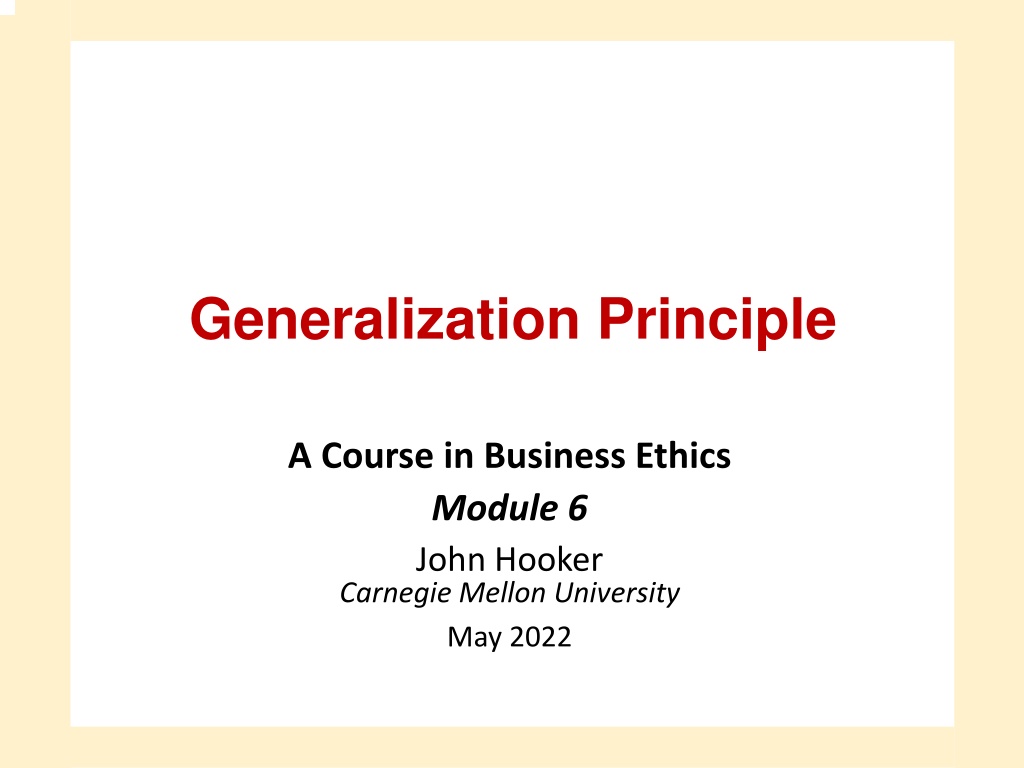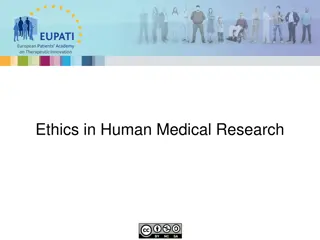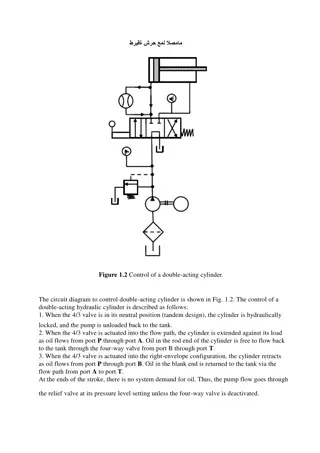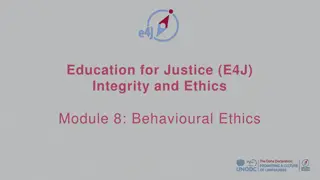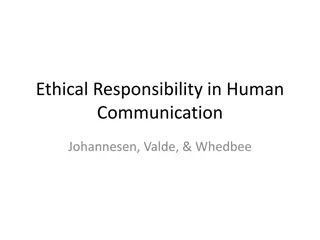Understanding Ethical Principles and Acting for Reasons
Ethical principles are crucial for objective decision-making, preventing rationalization. The Generalization Principle emphasizes the need for rationale in actions. The Universality of Reason asserts that rationality is independent of personal identity. Acting for Reasons theory underscores that every action has a rationale, distinguishing free choice from mere behavior. Dual Standpoint Theory provides a foundation for ethics, highlighting the importance of ethical principles for coherent actions.
- Ethical Principles
- Generalization Principle
- Universality of Reason
- Acting for Reasons
- Dual Standpoint Theory
Download Presentation

Please find below an Image/Link to download the presentation.
The content on the website is provided AS IS for your information and personal use only. It may not be sold, licensed, or shared on other websites without obtaining consent from the author. Download presentation by click this link. If you encounter any issues during the download, it is possible that the publisher has removed the file from their server.
E N D
Presentation Transcript
Generalization Principle A Course in Business Ethics Module 6 John Hooker Carnegie Mellon University May 2022
Ethical principles We must have principles for resolving issues in an objective way. Otherwise we can rationalize anything. Generalization principle Utilitarian principle Autonomy principle 2
Basic assumptions Universality of reason You don t get to have your own logic. Acting for reasons Freely chosen action is based on a rationale. 3
Basic assumptions Universality of reason You don t get to have your own logic. Acting for reasons Freely chosen action is based on a rationale. This is the deontological approach to ethics. Deontology = What is required. Ethical principles represent what is required for the possibility of free action. 4
Universality of reason What is rational does not depend on who I am. I don t get to have my own logic. The assumption underlies science and all forms of rational inquiry. Ethics assumes nothing more. 5
Acting for reasons Basic premise: We always act for a reason. Every action has a rationale. Why? This is how we distinguish freely chosen action from mere behavior. An MRI machine can detect our decisions before we make them. If decisions are determined by biological causes, how can they be freely chosen? 6
Acting for reasons Solution: Free chosen actions have two kinds of explanation: A biological cause A rationale provided by the agent For example: A hiccup has only a biological explanation. Not a freely chosen action. Drinking water to stop hiccups has 2 explanations: a biological cause and a rationale. A freely chosen action. 7
Acting for reasons Dual standpoint theory Originally proposed by Immanuel Kant. Grundlegung zur Metaphysik der Sitten (1785) Recent versions: Nagel (1986), Korsgaard (1996), Nelkin (2000), Bilgrami (2006). Provides a basis for ethics. Ethical principles are necessary conditions for the logical coherence of an action s rationale. 8
Generalization principle My action has a reason behind it. Why? Every action has a rationale. So if the reason justifies the action for me... It justifies the action for anyone to whom the reason applies. Why? Universality of reason. 9
Generalization principle Maybe I don t agree with universality of reason. Why can t I say, My arguments show that cheating is unethical, but others are free to believe something else. They are, but I am saying they would be wrong. That s what it means to believe that cheating is unethical. 10
Generalization principle Maybe I don t agree with universality of reason. Why can t I say, My arguments show that cheating is unethical, but others are free to believe something else. They are, but I am saying they would be wrong. That s what it means to believe that cheating is unethical. Suppose I say, My calculations show that 7 + 8 = 15, but others are free to believe that 7 + 8 is something else. They are, but I am saying they would be wrong. That s what it means to believe that 7 + 8 = 15. 11
Generalization principle Example Suppose I steal a watch from a shop. I have 2 reasons: I want a new watch. I won t get caught. Security at the shop is lax. 12
Example - Theft So I am making a decision for everyone: All who want a watch and think they won t get caught should steal one. 13
Example - Theft So I am making a decision for everyone: All who want a watch and think they won t get caught should steal one. But I know that if all do this, they will get caught. The shop will install security. My reasons will no longer apply 14
Example - Theft I am not saying that all these people actually will steal watches. Only that if they did, my reasons would no longer apply. 15
Example - Theft My reasons are inconsistent with the assumption that people will act on them. I am caught in a contradiction. I am deciding that these reasons justify theft for me. But I am not deciding that these reasons justify theft for others. I can t have it both ways. 16
Generalization principle The principle is: The reasons for an action should be consistent with the assumption that everyone with the same reasons acts the same way. Immanuel Kant, 1724-1804 17
Generalization principle Or more precisely: It should be rational for me to believe that the reasons for my action are consistent with the assumption that everyone with the same reasons acts the same way. Immanuel Kant, 1724-1804 18
Example - Cheating What is wrong with cheating on an exam? My reasons: I will get a better grade. Which means I will get a better job. 19
Example - Cheating Nearly all students have these reasons. If they all cheat Everyone will have a top grade. Good grades won t get me a better job. 20
Example - Agreements Breaking an agreement violates generalization principle. If I break it merely for convenience or profit. An agreement (or contract) is a mutual promise. 21
Example - Agreements Suppose everyone broke agreements when convenient. It would be impossible to make agreements in the first place. And therefore impossible to achieve my purposes by breaking them! The whole point of having an agreement is that you keep it when you don t want to keep it. 22
Example - Lying Lying for mere convenience violates the generalization principle. If the reason for lying implies that people will believe the lie. If everyone lied when convenient, no one would believe the lies. The possibility of communication presupposes a certain amount of credibility. 23
Example - Lying Lying can be generalizable, depending on the reasons. Workers in an Amsterdam office building lied to Nazi police, 1940-42. They denied knowing the whereabouts of Anne Frank s family, who they knew were hiding in the building. Their purpose was to avoid revealing a Jewish family s location to the Nazi regime. 24
Example - Lying Lying can be generalizable, depending on the reasons. This is generalizable If everyone lied to avoid revealing a Jewish family s location to the Nazi regime, it would still be possible to accomplish this purpose by lying. It would not be necessary for the police to believe the lies. 25
Alternate formulations The generalization principle can be formulated: It should be rational for me to believe that I could achieve my purposes if everyone with my reasons acted the same way. I would not achieve my purpose by cheating if everyone cheated to get a better job. 26
Alternate formulations The principle can also be formulated: It should be rational for me to believe that the practice or institution that makes achieving my purposes possible would not be undermined if everyone with my reasons acted the same way. The institution of grades would be undermined if everyone cheated to get a better job. 27
Example - Theft Suppose I steal whenever it is convenient and profitable for me. Why is this unethical? Because it is illegal? Suppose it were legal. Would this make it OK? 28
Example - Theft Suppose I steal whenever it is convenient and profitable for me. Why is this unethical? Because it is illegal? Suppose it were legal. Would this make it OK? It would undermine the institution of property. I steal something to have possession and use of it. That is, to make it my property. If everyone stole for convenience, there would be no institution of property. When I steal something, others will steal from me 5 minutes later. 29
Example - Deception One can deceive without lying. For example, if your doctor deliberately neglects to mention a serious diagnosis. There is no lying, only deception. Deception = causing someone to believe something you know is false. 30
Example - Deception One can deceive without lying. For example, if your doctor deliberately neglects to mention a serious diagnosis. There is no lying, only deception. Deception = causing someone to believe something you know is false. Deception, merely for convenience, is not generalizable. It would not deceive if generalized. 31
Getting the reasons right Gertrude Grosvenor says: I am stealing a watch because: I want it. I can get away with it. My name is Gertrude Grosvenor This is generalizable Only one person in the world has the name Gertrude Grosvenor. 32
Getting the reasons right Gertrude Grosvenor says: I am stealing a watch because: I want it. I can get away with it. My name is Gertrude Grosvenor This is generalizable Only one person in the world has the name Gertrude Grosvenor. But her name is not a reason. She would steal if she learned her name is Genevieve. 33
Getting the reasons right The scope of her rationale is too narrow. Scope = set of circumstances under which she would steal Gertrude s name is not part of her rationale for stealing. The stated rationale is too narrow. 34
Getting the reasons right The scope of her rationale is too narrow. Scope = set of circumstances under which she would steal Gertrude s name is not part of her rationale for stealing. The stated rationale is too narrow. The reasons must be seen as individually necessary and jointly sufficient for the action. Gertrude s name is not necessary. 35
Human decision making A flaw in rationality-based ethics? Most of our actions are automatic. We can t devise a rationale for everything we do. We are creatures of habit. This doesn t mean we are unethical most of the time. 36
Human decision making A flaw in rationality-based ethics? Most of our actions are automatic. We can t devise a rationale for everything we do. We are creatures of habit. This doesn t mean we are unethical most of the time. Dual process theory agrees. System 1 thinking is fast and unconscious. System 2 thinking is slow and based on conscious reasoning. We usually rely on System 1. 37
Human decision making Ethicists are well aware of this Going back at least to Aristotle. We allows habits to continue. If I continue smoking, I make a decision not to break the habit. 38
Human decision making Ethicists are well aware of this Going back at least to Aristotle. We allows habits to continue. If I continue smoking, I make a decision not to break the habit. We can invoke system 2 thinking when needed. This is where ethics comes into play. 39
Human decision making This is why business ethics is hard. It constantly demands System 2 thinking. We can t rely on unthinking habit to decide Whom to hire or lay off. When to close a plant. Whether to sell customer data. Etc. etc. etc. 40
Further reading J. N. Hooker, Taking Ethics Seriously, Taylor & Francis (2018), Chapter 3 J. N. Hooker, Advanced Introduction to Business Ethics, Edward Elgar (2021), Chapter 3 41
